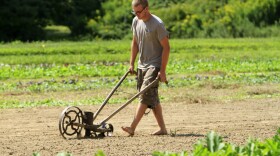Dan Charles
-
Ecologist Gergana Daskalova moved back to the small Bulgarian town of her childhood. It's a place many people have abandoned — and that's the very reason she returned. At the same time as land is being cleared around the world to make room for agriculture, elsewhere farmland is being abandoned for nature to reclaim. But what happens when people let the land return to nature? This episode, science reporter Dan Charles explains why abandoned land has conservationists and researchers asking: If we love nature, do we tend it or set it free? Read more of Dan's reporting for Science Magazine and NPR.Want us to cover other about ecology, biodiversity or land science stories? Let us know by emailing shortwave@npr.org! Listen to every episode of Short Wave sponsor-free and support our work at NPR by signing up for Short Wave+ at plus.npr.org/shortwave.
-
The grass pea is one: a hardy crop that can thrive in a drought. An agriculturist is spearheading an effort to diversify what farmers grow as climate change threatens staples like corn and wheat.
-
The act of providing food aid to countries in need turns out to be a complicated and controversial matter. Here's why.
-
Tons of green energy projects, both wind and solar, want to connect to the grid. But they're running into a surprising obstacle.
-
For years, powerful farmers in California's Central Valley fought for more water from the state's rivers. Now some are changing course, because there's no more water to be found.
-
Reformist farmers in California have deposed the leader of the country's biggest irrigation district, who was known for fighting water regulations. Farmers are accepting less water means less farming.
-
The two departments have a key role in supporting American households. HUD has responsibility for affordable housing, while USDA oversees food assistance programs.
-
The honey on supermarket shelves is probably real honey, after all. But claims that illicit Chinese honey was being sneaked into the U.S. market reveal how quick we are to assume the worst about supermarket foods — and imports. Closer analysis reveals a more complex tale.
-
Growing vegetables has never, in recent memory, been quite so cool, or so attractive to the young and well-educated. But many aspiring farmers lack hard, cold cash for land and farm equipment, a survey found.
-
American consumers like their honey bright and clear, but removing the pollen makes it hard to trace honey back to its source. A new report says three quarters of honey sold in the U.S. doesn't contain any pollen.








